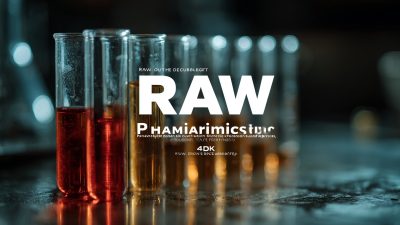
What is the Role of a Pharmaceutical Supplier in Global Supply Chains
The role of a Pharmaceutical Supplier in global supply chains is increasingly critical, especially in an era marked by rising complexities and heightened demands for efficiency. According to a report by the World Health Organization, approximately 50% of supply chain disruptions in the pharmaceutical sector are attributed to issues in sourcing and procurement, where pharmaceutical suppliers play a pivotal role.

Moreover, the global pharmaceutical market is projected to reach $1.57 trillion by 2023, emphasizing the need for reliable and effective supply chain management. As the industry grapples with challenges such as regulatory compliance, quality assurance, and the need for rapid response to market changes, the importance of robust partnerships with pharmaceutical suppliers cannot be overstated.
These suppliers not only ensure the availability of essential medications but also contribute significantly to the resilience and adaptability of the supply chain, ultimately impacting patient care and public health outcomes.
The Importance of Pharmaceutical Suppliers in Global Health Supply Chains
The pharmaceutical supply chain is a complex network that plays a crucial role in global health. Pharmaceutical suppliers serve as the backbone of this system, ensuring that medications are produced, distributed, and made accessible to populations in need. According to a report by Grand View Research, the global pharmaceutical supply chain market is expected to reach $10.5 billion by 2025, signifying the immense economic impact and importance of these suppliers in delivering health solutions worldwide.

A key aspect of pharmaceutical suppliers is their ability to maintain product quality and compliance with regulations. The World Health Organization (WHO) estimates that up to 10% of medicines in low- and middle-income countries are substandard or falsified, highlighting the critical need for reliable suppliers. Effective supply chain management can mitigate these risks and improve patient outcomes by ensuring that quality medications are readily available. Moreover, as the COVID-19 pandemic has demonstrated, pharmaceutical suppliers must be agile and responsive, adapting to sudden demands and disruptions to meet global health challenges efficiently. Their role is not merely logistical; it is vital for safeguarding public health on a global scale.
Key Functions of Pharmaceutical Suppliers in Global Distribution Networks
The pharmaceutical supply chain plays a crucial role in ensuring that essential medications reach consumers efficiently and safely. As the global pharmaceutical logistics market is projected to grow from $80.06 billion in 2025 to $140.13 billion by 2032, at a compound annual growth rate (CAGR) of 8.2%, the functions of pharmaceutical suppliers are becoming increasingly significant. These suppliers not only manage the procurement and distribution of drugs but also ensure compliance with regulatory standards, which is vital for maintaining the integrity of the supply chain.
Furthermore, the strategic collaborations between pharmaceutical companies and suppliers illustrate the importance of an agile and responsive supply network. For instance, recent partnerships have accelerated the commercialization of innovative cancer therapies, highlighting the suppliers' role in enhancing patient access and tailoring the distribution processes according to market needs. As the healthcare cold chain logistics sector also anticipates robust growth—with a projected market size of $55 billion in 2023 and a CAGR exceeding 9%—the emphasis on effective temperature-controlled logistics will further define the operational landscape for pharmaceutical suppliers in the coming years. Such dynamics underscore the necessity for advancements in supply chain technologies and digital transformation to address the evolving challenges in global pharmaceutical distribution.
Comparative Analysis: Local vs. International Pharmaceutical Suppliers
In the dynamic landscape of global supply chains, the role of pharmaceutical suppliers is critical to ensuring the timely availability of medicines. A comparative analysis of local versus international pharmaceutical suppliers reveals significant differences in their impact on supply chain efficiency. According to a report by IQVIA, the global pharmaceutical market is expected to reach $1.5 trillion by 2023, highlighting the burgeoning demand for reliable supply channels. Local suppliers often benefit from shortened lead times and the ability to swiftly respond to regional healthcare needs. For instance, the National Association of Boards of Pharmacy (NABP) indicates that local suppliers can deliver medications to pharmacies within 24 hours, thus enhancing patient care.
Conversely, international pharmaceutical suppliers offer advantages in scale and access to a wider range of products. The World Health Organization (WHO) reported that over 40% of essential medicines are sourced from global suppliers, indicating that they are pivotal in addressing deficiencies in local markets. However, they face challenges such as longer shipping times and regulatory complexities. A study by McKinsey emphasizes that while international suppliers reduce costs through bulk purchasing, local suppliers foster resilience in supply chains by mitigating risks associated with geopolitical tensions and trade disruptions. Therefore, both local and international suppliers play complementary roles in sustaining a robust pharmaceutical supply chain.
Role of Pharmaceutical Suppliers in Global Supply Chains
This chart compares the relative importance of local and international pharmaceutical suppliers based on various factors such as reliability, cost-efficiency, regulatory compliance, and speed of delivery.
The Impact of Regulatory Compliance on Pharmaceutical Supply Chains
The role of pharmaceutical suppliers in global supply chains is critically influenced by regulatory compliance. These suppliers must navigate a complex landscape of regulations that vary from country to country, ensuring that their products meet safety, efficacy, and quality standards. Compliance with these regulations not only prevents costly legal issues but also fosters trust between suppliers, manufacturers, and healthcare providers.
Tips: To remain compliant, suppliers should invest in robust training programs for their staff, focusing on the importance of adhering to regulatory guidelines. Staying updated with changes in regulations is essential; establishing a compliance monitoring system can help streamline this process.
Moreover, effective communication with all stakeholders within the supply chain is vital. Suppliers should work closely with regulatory bodies and industry partners to understand compliance requirements thoroughly. Utilizing technology can aid in maintaining accurate records and ensuring that all product shipments are traceable and compliant with international standards.
Tips: Consider implementing a comprehensive digital supply chain management system that allows for real-time tracking and reporting. This not only enhances transparency but also prepares suppliers for regulatory audits and inspections.
What is the Role of a Pharmaceutical Supplier in Global Supply Chains - The Impact of Regulatory Compliance on Pharmaceutical Supply Chains
| Dimension | Description | Impact on Supply Chain |
|---|---|---|
| Regulatory Compliance | Adherence to laws and regulations governing pharmaceutical supply | Ensures product safety and quality, reduces risk of legal issues |
| Quality Assurance | Processes that ensure the manufactured products meet quality standards | Enhances trust and reliability in the supply chain |
| Traceability | Ability to track the history, location, and application of products | Increases transparency and accountability in case of recalls |
| Supplier Audits | Regular evaluations conducted to ensure suppliers meet compliance standards | Mitigates risks associated with supplier non-compliance |
| Market Access | The ability to distribute products across different regions | Compliance can either facilitate or hinder market access |
| Risk Management | Strategies to minimize risks in the supply chain | Ensures sustained supply despite regulations or market changes |
Technological Innovations Transforming Pharmaceutical Supply Chain Dynamics
The advancement of technological innovations is revolutionizing the dynamics of the pharmaceutical supply chain. According to the 2023 Pharmaceutical Report by IMS Health, the global pharmaceutical market is projected to reach $1.5 trillion by 2025, underscoring the critical importance of supply chain efficiency and reliability in meeting this demand. Technologies such as artificial intelligence (AI), blockchain, and the Internet of Things (IoT) are reshaping how suppliers manage operations, from manufacturing to distribution.
AI is enhancing predictive analytics, allowing suppliers to anticipate demand fluctuations and mitigate stock shortages. A recent study from Deloitte highlighted that companies leveraging AI in their supply chain strategies could reduce operational costs by up to 20%. Additionally, blockchain technology offers heightened transparency and traceability, critical for ensuring compliance and safety. As a result, pharmaceutical suppliers can verify the authenticity of drugs, minimizing the risks associated with counterfeit products, which have become a major concern in the industry—estimated to cost the global economy around $200 billion annually. This digital transformation not only streamlines processes but also strengthens the overall integrity of the supply chain, ultimately benefiting patients worldwide.

Related Posts
-

2025 Global Market Insights: 7 Essential Tips for Sourcing Pharmaceutical Products Effectively
-

Unlocking Global Opportunities in Pharmaceutical Products at the 137th Canton Fair 2025
-

Unlocking the Secrets of Best Raw Pharmaceutical Specifications and How to Choose the Right Supplier
-

5 Reasons Why You Should Choose the Best Pharmaceutical Products for Global Sourcing
-

The Ultimate Guide to Sourcing the Best Pharmaceutical Materials for Global Procurement
-

Maximizing ROI: The After-Sales Service Edge in Best Peptide API Manufacturing
